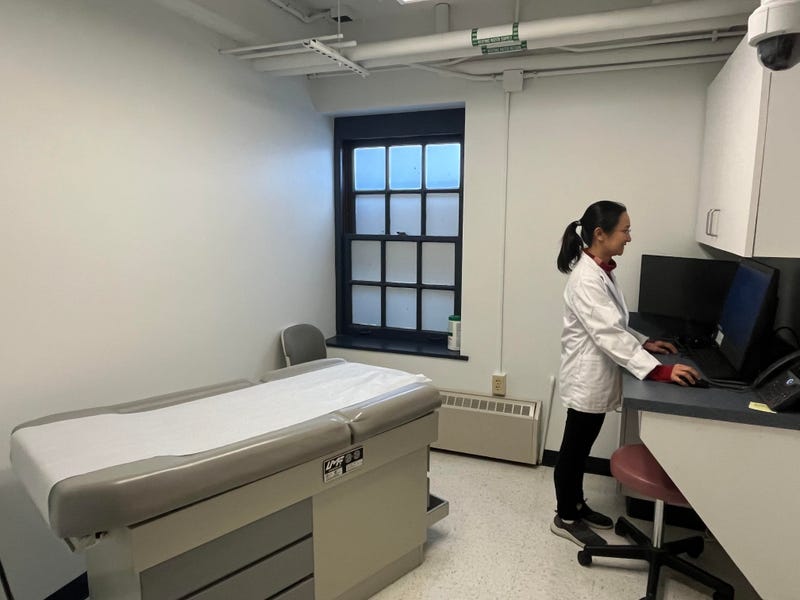
Buffalo, N.Y. (WBEN) - The pandemic put a spotlight on the integral role of healthcare workers, their lifesaving duties and often times long and hard hours.
Now, the world is in the midst of a nursing shortage and the University at Buffalo is proactively looking to recruit more nurses into their program and address the issue.
"There is a nursing shortage right now," says Gail Markowski, a registered nurse practitioner and Co-Director of the Adult-Gerontology Program for the University at Buffalo. "It has been coming for quite a while and we, I think, all have kind of known about the nursing shortage, and anticipated it for a couple of years."

Why is there a nursing shortage?
The shortage is not due to a decrease in enrollment. There are many factors, "They used to talk mainly about the baby boomers retiring and that in and of itself, would cause a little bit of a dent in our nursing population," Markowski says.
Another concerning issue that quickly took shape around the shortage, was the COVID pandemic, which caused a whole series of anxiety-inducing situations and long hours for the healthcare workers.
"The COVID pandemic, you have seen a lot of what they're labeling as 'burnout' with nurses and I have to say, even though I'm not a big fan of that term, I think it kind of hits home. There are a lot of nurses out there that have been working with a lot of difficult assignments, they have had to do things that they ordinarily wouldn't have done before. Many hours, many, many issues that cause great stress, a lot of people were afraid of contacting COVID themselves and bringing it home to their family. I think that has caused just a great deal of stress," said Markowski.
In addition to all these reasons, Markowski also adds, "Hospitals, they have lost funds and it has impacted the financial situation with a lot of nurses as well. You see people leaving, yet the patient population remains very ill. Everybody's getting older every day and with that comes a lot of health issues and nursing is more difficult to practice. Patient assignments can be very rough. As you have the nurses leaving, you're having the nurses that are left in those positions having quite a bit of a heavier load because they're making up for nurses that have gone. Also, there is a shortage of nurses and has been for a bit also due to a shortage of nursing faculty and that has been going on for a few years. They say that there are a lot of programs that are turning away potential qualified students because they don't have the faculty. Luckily, that is not the case here at UB."
Addressing the shortage
Fortunately for the University at Buffalo, enrollment has remained steady in their registered nursing programs, but Markowski notes the enrollment numbers have started to level off in the nurse practitioner field, so the campus is trying to actively grow their numbers as well as look for ways their students can accommodate the areas that need staffing the most.
The university identified that rural areas predominantly have the most difficulty getting access to healthcare and are greatly underserved, which is why they received a grant from the state to expand their program to Alfred State College, which is located near five counties in New York State that are predominantly rural.
Markowski explains, "[We're] offering nurses in that Alfred State College area, in those five counties, the opportunity to go back to school at Alfred and our adult Gerontology program at Alfred without having to drive into Buffalo, they can stay right in their area. Working together and being able to offer nurses the opportunity to obtain their doctorate in nursing, but most important, that nurse practitioner, so that they can also become providers. Research has shown that people who live in rural areas, tend to stay in the rural area. The hope is if we can get some RNs to go through this program, that they will become providers themselves to help alleviate the problem."
The University at Buffalo is very actively trying to recruit people into these nursing programs, specifically the gerontology program as Markowski explains there have been some issues with spreading the word and some misconceptions with the study of gerontology, "The career path that will lead them to become a nurse practitioner is not readily known. Our program, the Adult Gerontology NP program, a lot of people hear the word 'Gerontology,' study of age, and they think, 'I don't want to work in a nursing home.' While, there's nothing wrong with working in a nursing home, there are so many more things, so many more sites that people with this degree can work at, hospitals, primary care facilities, specialty care facilities. You can care for the very young adult, up until the end of life. A lot of people aren't aware of that."
Recruitment efforts
Other than looking for partners for the grant, Alfred State College and University at Buffalo have been working diligently to get the word out for this program.
Specifically, the colleges have has a presence attending various recruiting events, such as job fairs. They also have been reaching out to nurses who have graduated from Alfred years ago to provide them with information.
Markowski explains that she herself, has gone back to do extra study in the nursing space and that the programs the offer range vastly for any student interested in nursing, "We have extra classes that are specifically for people taking care of the very elderly. After the core courses are completed, we have a concentration in primary care and we also have a concentration of courses in acute care, we kind of cover the gamut here."
Perspective from a nursing student
Ping Kang is a UB nursing student involved in the gerontology program, who will be getting her DNP (Doctor of Nursing Practice) degree next May, as she graduates next semester.
"I just wanted to do something where I could make a difference everyday," said Kang.
For 8 years, she has been working in a rural hospital in Ontario, Canada and decided to come back to school for more advanced education, "With the nursing and provider shortage, it put more work on myself and I've had much more responsibilities.
Kang chose to do her doctorate project looking into the barriers of rural nurses who could go back to school to achieve practitioner status, "I find a lot of my colleagues, they are very good candidates to go back to the school to advance their career paths. However, there's many difficulties for them that stop them from doing that."
She cites child care, long distances for education and other home duties as main reasons some of her colleagues don't consider going back to school.
Recently due to the blizzard, Kang says she had to complete at 24-hour shift at the hospital on Christmas Eve, taking one 2-hour break, "I never feel ready, but I'm always ready for the challenges."
Kang advocates for others who are interested in nursing, to pursue these programs at Buffalo and Alfred as they are great career advancers and will encompasses multiple specialities in healthcare industry, "I never have regretted becoming a nurse, it is very rewarding."
